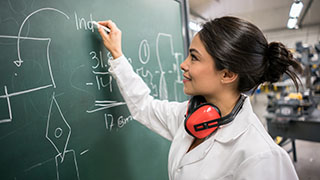Olga Ricketts-Peart is not what she calls a “science person.” But she loves science anyway.
The 77-year-old has been attending “Science with Seniors,” a program offered at the Levy Senior Center in Evanston that’s gone online in the past few months due to the COVID-19 pandemic.
The third Thursday of each month, graduate students from Northwestern University meet virtually with seniors from the Levy Center for lectures on science and technology, topics that range from sleep to solar cells.
“It’s a good, brief overview on how these topics affect their lives as adults and seniors,” says Tim Carter, program coordinator of the Levy Center. “And it’s a good way for the Northwestern students to reach out and share what they have learned about their studies.”
The idea for the program came from Suyog Padgaonkar, a chemistry student working on a doctorate at Northwestern. When Padgaonkar started at the university in 2016, he saw that most of the outreach opportunities offered revolved around kids.
He says he wanted to reach the older, voting population because it seemed there was a lot of misinformation among that group.
“In terms of being able to provide information for people who currently vote, it just felt like that opportunity was a little bit lacking,” Padgaonkar says. “So the simple idea was to reach out to senior citizens because they vote a lot.”
:no_upscale()/cdn.vox-cdn.com/uploads/chorus_asset/file/21894196/Suyog.jpg)
The program started at the Covenant Home in Andersonville in the spring of 2017, then moved to the Levy Center and expanded in January to also include Belmont Village, according to Emily Schafer, a biomedical engineering doctoral student working with Padgaonkar.
Carter says the lectures started as in-person meetings with a group at the senior center but went online because of the COVID-19 pandemic.
The session this past week covered sleep and how it affects memory.
“I saw it as an opportunity to reach new crowds,” says Eitan Schechtman, a postdoctoral fellow in psychology who was the host.
Schechtman says the online format was a challenge. He wasn’t sure whether people were listening because most participants disabled their videos.
“If something I said was confusing, I just had to assume that they were with me and also go a bit slower than I would’ve went if I were able to see their faces,” Schechtman says.
Padgoankar says doing the lectures online has been harder since the program was designed to be interactive and discussion-based.
But Ricketts-Peart says the virtual format wasn’t any different from the in-person sessions she attended before the pandemic and might even havet felt more personal.
“I’m sitting at the computer, I’m looking right into his eyes, I’m looking right at him,” she says. “When I’m at the Levy Center, sometimes you’re there, but you can’t see the person’s face.”
Carter sees the science lectures as having another benefit, helping fight social isolation seniors face, especially while stuck at home during the pandemic.
Padgoankar hopes the idea of offering scientific education to seniors can be expanded to other senior centers and also to other schools.
Ricketts-Peart hopes the program keeps going after the pandemic ends. She says it’s a way to keep her mind sharp.
“You need to learn not only things you already know but new things to get your brain working,” she says. “We want something that is continually renewing our minds.”





More Stories
Stevens and Seton Hall University Announce Dual-Degree Program
Science and Technology Minister Harsh Vardhan launches CSIR technologies for rural development
NanoAffix Science one of six Wisconsin companies to get state and federal funds to help commercialize products